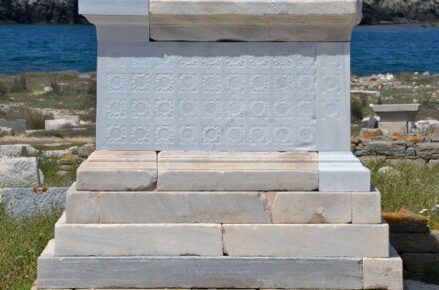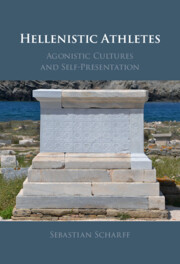
By exploring how athletic champions wanted their victories to be understood, “Hellenistic Athletes” sheds new light on the relationship of sport, society and politics in the Greek world. Read the full blog post by author Sebastian Scharff:
A Gateway to the Mindsets of Greek Athletes
The exclusion of Russian athletes from athletic contests is a recent example of the fact that sport and politics do not operate in mutually independent arenas. One of the prerequisites for the ban is the notion of the political power of athletic self-presentation: due to their sporting successes, victorious athletes have the authority to send strong messages which have the potential of becoming politically precarious. This holds all the more true for societies in which agonistic victories are considered as indication of divine support, as it was the case in ancient Greece.
In Hellenistic Athletes. Agonistic Cultures and Self-Presentation, I explore the relation between sport and politics, athletes and society from the perspective of the victors. I ask in what ways sporting successes were harnessed politically in the numerous political communities of the Hellenistic period. By examining agonistic epigrams as poetry on commission, I use the poems as a gateway to the mindsets of Greek athletes and horse owners. The goal is to investigate how agonistic champions of the time wanted their victories to be commemorated.
Agonistic Cultures and Political Conversations
However, the focus is not on the individual athlete’s perspective alone but on the way in which such views interacted and influenced each other: groups of sporting victors who emphasized similar motifs in their victor poems are identified, as conversations over the political meaning of agonistic success or the way a victory should be achieved are unveiled. Both approaches profit from the identification of significant features that exceeded the conventions of the genre: when sporting success is fueled with political, that is local, regional and imperial meaning, competitive constellations beyond the field of athletics become visible (Sparta vs. Messene) and a multiplicity of agonistic cultures on three different levels can be detected: those of the polis, the region and the empire. Kings and queens used athletics in order to legitimate their rule (Ptolemies, Attalids), cities tried to compensate for military defeats by agonistic success (Thebes, Messene, Rhodes), and victorious aristocrats created virtual halls of fame to emphasize their common regional identity (Thessaly). Without a doubt, athletic victories represented far more than just the leisure activities of Hellenistic noblemen. They mattered strongly in terms of politics and social status.
Cultural History through the Lens of Athletic Self-presentation: Hellenistic Athletes Joining the Discourse
It is very clear today that the Hellenistic age did not see an overall decline in athletic competition. Rather, the third and early second centuries BC saw one of the heydays of ancient athletics (the time after the Mithridatic Wars is a different matter). However, this book is not simply intended as a history of sport in the Hellenistic age. It is a study of some of the main social, political, and cultural processes of the period through the lens of athletic self-presentation. The field of athletics reflects characteristic developments of the time including the expansion of the Greek world, the heyday of Greek monarchy and even the coming of Rome. By exploring the way some of the protagonists of the era perceived the world in terms of athletics, a study on athletic self-presentation contributes to central debates on Hellenistic history such as those on the Hellenistic polis, ethnic identities, euergetism and royal/dynastic representation.
As agonistic epigrams have the capacity to serve as a gateway to the mindsets of Greek athletes, athletics is a gateway to the understanding of Greek history. When political competition is transferred from the political arena to the agonistic sphere, when sporting ambition becomes social capital, when athletic success is turned into legitimization of power, Hellenistic Athletes join(s) the discourse.

Hellenistic Athletes
by Sebastian Scharff
Latest Comments
Have your say!